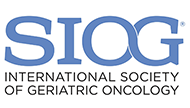Written by Dr. Jessica Krok-Schoen is an Assistant Professor in the Division of Health Sciences, School of Health and Rehabilitation Sciences at The Ohio State University’s College of Medicine.
 The Cancer and Aging Research Group’s (CARG) Advocacy Committee recently published two manuscripts in the Journal of Geriatric Oncology regarding cancer care providers’ care for older adults with cancer during the COVID-19 pandemic. The specific objectives were to learn, in the context of COVID-19, about: 1) the provision of and concerns about cancer care for older adults; 2) decision making regarding cancer treatment and Do Not Resuscitate (DNR) orders; and 3) barriers and facilitators related to the care of older adults with cancer, particularly regarding telehealth. The CARG Advocacy members, along with the Association of Community Cancer Centers (ACCC), developed and distributed a Qualtrics survey for multidisciplinary team members responsible for the direct care of people with cancer. Survey data was collected from April-May 2020 and had 274 respondents, including oncologists, advanced practice providers, social workers, and navigators, to name a few.
The Cancer and Aging Research Group’s (CARG) Advocacy Committee recently published two manuscripts in the Journal of Geriatric Oncology regarding cancer care providers’ care for older adults with cancer during the COVID-19 pandemic. The specific objectives were to learn, in the context of COVID-19, about: 1) the provision of and concerns about cancer care for older adults; 2) decision making regarding cancer treatment and Do Not Resuscitate (DNR) orders; and 3) barriers and facilitators related to the care of older adults with cancer, particularly regarding telehealth. The CARG Advocacy members, along with the Association of Community Cancer Centers (ACCC), developed and distributed a Qualtrics survey for multidisciplinary team members responsible for the direct care of people with cancer. Survey data was collected from April-May 2020 and had 274 respondents, including oncologists, advanced practice providers, social workers, and navigators, to name a few.
Results identified in the first manuscript summarized the quantitative data in the survey. Most survey respondents strongly believed that Do Not Resuscitate (DNR) status should be a shared decision with patients in every scenario. Respondents also reported their patients had significant increases in barriers such as transportation, caregiver availability, and access to food and prescriptions.
The second manuscript focused on the qualitative data from the survey’s three open-ended questions regarding clinical barriers, questions asked of health care providers by patients, and experiences as a member of the cancer care team during the COVID-19 pandemic. Results indicated multiple clinical barriers to care, ranging from institutional to individual difficulties during the COVID-19 pandemic. The most common questions asked by older adults with cancer were patients’ health and cancer care, basic needs and support, and future and pandemic timeline.
These papers highlight the importance of geriatric oncology nursing, social work, and other allied health (NAH) professionals within multidisciplinary care teams caring for older adults with cancer during the COVID-19 pandemic. Given the current resource-limited climate, coupled with visitor restrictions, shared decisions about DNR status may be more challenging than before. It is essential that nurses and social workers play an active role in facilitating discussions about DNR with older adults with cancer, their families, and other members of the health care team. The multidimensional barriers experienced by older adults with cancer, necessitate a multidisciplinary approach to address and resolve these challenges. NAH professionals should be aware of these patient barriers and consider simple, common-sense interventions that are beneficial, appropriately based on medical need, and avoid unnecessary exposure to the virus while maintaining therapeutic relationships and cancer management. Some action items can include connecting older adults with cancer to a local food bank, appropriately identifying and assessing the availability of a caregiver along with caregiver burden, and working with an Area Agency on Aging to coordinate safe rides to appointments. Lastly, these findings stress the importance of resource and support allocation for older adults with cancer and NAH professionals during the COVID-19 pandemic.
Please see the links to the papers below
- Survey of cancer care providers’ attitude toward care for older adults with cancer during the COVID-19 pandemic : https://pubmed.ncbi.nlm.nih.gov/33144071/
- Experiences of healthcare providers of older adults with cancer during the COVID-19 pandemic: https://pubmed.ncbi.nlm.nih.gov/32978104/


